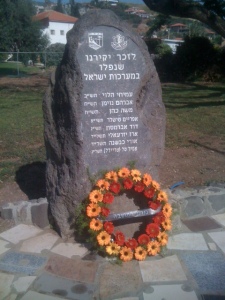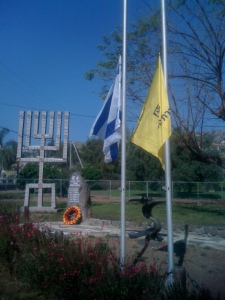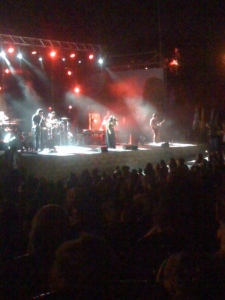A few days ago we observed Israel’s Memorial Day and 24 hours later, we celebrated Independence Day. It’s no coincidence. For years there was talk of separating the dates, yet 2/3 of Israelis believe they should be kept together: reflection, prayers, ceremonies, mourning for the fallen soldiers who’d sacrificed their lives for the nation followed immediately by fireworks, picnics, bbq’s.
Talk about a sharp transition.
As a kid growing up in Israel, the flag and Israel were one. We wrapped our bodies in them. We smashed noise-making, plastic hammers over the heads of adults, watched military parades march down the boulevards, threw our chests out in pride, watched fighter jets streak the sky above, sank our teeth into husks of corn, and licked the sugar from swirls of cotton candy.
It may not have been a romantic age (we had a war every decade), but no one dared to think of Israel other than a small country against big enemies.
This notion is still true today, but you can’t help but notice that at age 65, Israel’s age is showing. It’s no longer the ideal of yesteryear, that of the pioneers. This week, for instance, in the days leading up to Independence Day, teenage boys and girls could be seen dashing across busy intersections in the cities, in the countryside, everywhere. They’re not hawking bags of oranges or baskets of strawberries. Instead, they’re selling Israeli flags to drivers at a red light. Business is brisk.
But not everywhere.
A recent survey confirmed an uneven support for the buying of the flags. They are snatched up in Jerusalem among the religious. The ultra-orthodox, a fringe yet vocal group, oppose Israel altogether. They wouldn’t be caught dead with the flag. As for the Arab Israelis, they wouldn’t be caught dead or alive with the flag.
That leaves the secular, the people in towns, the kibbutniks, the hard-core seniors. They wave the flags proudly, hoist them on every pole, stick them on car rooftops, hang them from every balcony. Yet many of the flags go begging in Tel Aviv. Why? Don’t they love their country? It seems their patriotism comes with questions.
Memorial Day is a solemn affair. At 11 AM, sirens wail for 2 minutes across the nation. Everything comes to a stand still. Cars stop. Buses stop. The young and old lower their heads. Ceremonies are held. Gun salutes. Tributes. The lowering of the flag to half-mast. Speeches by the prime minister, the president. The radio plays patriotic songs for 24 hours. There are no soccer games, game shows, comedies, or movies on television. Stores close early. My daughters attend a ceremony at their school in Galilee, hear speeches, listen to sad songs.
The nation unites.
Among all this unity there are pockets of dissent. And it comes from the most unlikely place. It comes from some of the mothers and fathers who had lost their sons in battle. They find no solace in being honored during Memorial Day. They’re the minority still. They love Israel. They didn’t pack up and leave the country. They want change.
The grieving parents, and sometimes the siblings of the deceased want to be left alone. They want to grieve in private. They don’t want the national scrutiny, the attention, the adulation. One mother had said she was robbed of what to inscribe on her son’s tombstone. She wanted inscribe that her son was survived by his brother and sister. The military refused. In that respect it’s not much different from the American G.I. (General Issue). All tanks are manufactured the same, all army boots are sewn to a specific standard, all uniforms, mess kits, rifles, helmets are General Issue, as are the men and women. They are but one component of the war machine. And for that reason, the Israeli military allows one inscription on the stone: “Had fallen bravely in defense of the nation.”
To question Memorial Day is to question loyalty. This may explain why Channel 2, in its effort to air opposing views, but also not alienate its core viewers, chose to air the controversial documentary “It’s Good to Die for Our Country” at 11 at night, well beyond prime-time.
In the film, writers and thinkers, all of whom had lost their sons or loved ones in war, no longer want the “worship of mourning” and the “glorification of death,” in their words.
In the afternoon, my daughter Maya asks for help with her geography homework. The assignment for Memorial Day: Identify villages and towns on the map that were named after the fallen. Since Israel’s founding in 1948, some 24,000 had lost their lives in wars, acts of terror.
At 8 at night, Memorial Day is over. Time to wipe away the tears and to celebrate Independence Day. At hour later, we join 2500 residents in Kfar Tavor at the central park to view a comedy show, to sing, to ooh and aah over the fabulous fire works.
Happy Birthday, Israel.
________________________________________________________________________________________
Maurice Labi is an Israeli-American who lived in Los Angeles for many years. In 2011 He returned to Northern Israel (Galilee) with his wife and twin teen-age daughters. He is of two lands, of two cultures and he blogs about his experiences in Israel, particularly from Galilee where Jews and Arabs dwelled for centuries.
He has also written three novels: “Jupiter’s Stone,” “Into the Night,” and “American Moth” — available at Amazon.com or BN.com.



